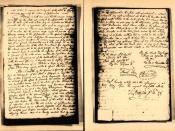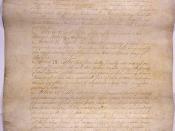After America had declared independence from Great Britain in 1776, the next step was to construct a new set of government laws to govern the new nation. This was a task left up to the Confederation Congress, who adopted the Articles of Confederation in 1781. The Articles of Confederation were a good idea in theory, but when put into use by the colonies proved to be weak, and failed.
The Articles failed for many reasons. One of the main reasons was that Congress had no control over taxes, and the individual states wouldn't give the federal government the money it needed. This meant the federal government could not pay off the millions of dollars of debt from the revolution. There was also no money to get any type of military force together. This left the American borders vulnerable to attacks or invasions from Spain and Britain. Congress also had no power over foreign or interstate trade.
This led to economic problems because each state was making their own laws, own money, and taxing each other. This led to chaos because one state's currency may not be usable in any other state.
Another problem was that there were no federal courts. Disagreements between states were hard to settle because, just like with the currency, each state only recognized its own laws. This led to criminals not being penalized because they would just go to another state.
Also, under the Articles, each state had one vote in Congress, no matter the size of the state. This caused problems because the larger states thought they should have more representation because they had a larger population. The larger states often ignored Congress and did what they wanted, like negotiate with foreign nations. They got away with this because there was no way to punish...


